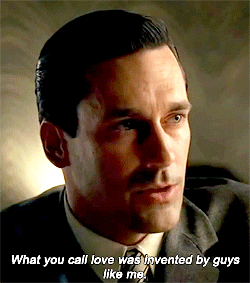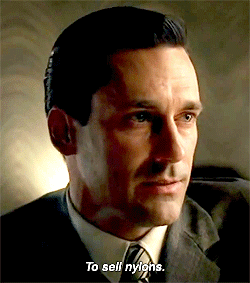
Or, Orange is the New Black Lives! The Giant Squid Was Photoshopped! Blake Griffin Didn't Smack Justin Bieber!
I don't wanna kill you! What would I do without you? ... No, no, you complete me.
Two things happened to me recently: 1) I was one of the thousands momentarily duped into believing that Orange Is the New Black would be discontinued, and 2) I read several excellent takedowns of clickbait. Internet culture -- particularly how and why ideas spread -- is a personal and artistic fascination of mine, so, needless to say, this stuff has been on my mind for a while. I too am disillusioned by what has emerged as the dominant mode of information transmission. I too am frustrated by the deluge of garbage I must sift through whenever I choose to engage with social media. I too feel that the many forms of clickbait pander to a lowest common denominator. Most of all, I find it regrettable that otherwise-reliable news sources believe they must condescend to this model in order to compete in the market.
But those "pointless," "unfunny" hoaxes that leave you feeling like the most gullible kid on the block? They actually function in direct opposition to the cascade of lists, misleading assertions, personality quizzes, and gossip fodder presently cluttering your Facebook or Twitter page. In fact, en masse, they are one of the only agents combating the system so many claim to despise. In "Can you answer these 4 questions and save the media industry from Taylor Swift?" Nilay Patel breaks down the psychology behind clickbait:
Clickbait headlines are so out of control that The Onion just launched an entire site to make fun of them. They irritate and annoy. But they're also super effective at driving traffic and attention, because they're basically just games. Upworthy's now-infamous "You'll never guess what happened next" headline construction is a one-question pop quiz, a call for the reader to actually guess what happened next, and then verify that guess by reading the article. It creates value because there's a chance you'll be rewarded with the smug satisfaction of being right. (And even if you're not, you still get to share that question on Facebook to trick your friends.) Clickbait irritates when the real answer doesn't live up to the wildest guesses of the reader; no one cares if what happened next is actually boring. The virtual scarcity of the game doesn't create any value.
This dissection highlights clickbait's most crucial element -- an element that is, paradoxically (tellingly), the least discussed: Clickbait does not and cannot exist without viewers able to be "baited" into clicks. As Patel astutely points out, "victims" of clickbait are ultimately being "suckered" by their own desires for superiority and entertainment. Clickhole, the Onion affiliate Patel references, is the deftest force working out in the open to impugn clickbait culture, reinforcing Christopher Hitchens' sentiments regarding mockery:
Mockery ... is one of the most essential things.... One of the beginnings of human emancipation is the ability to laugh at authority; it's an indispensable thing.
Whatever your feelings about religion, the point he makes in regard to mockery holds in any context. Institutions establish the status quo. The social forces that react against that status quo, regardless of effect or intent, are necessary in maintaining a system of checks and balances. To call American culture media-obsessed is an understatement of the highest order. To my mind, it's the taproot of our worst problems, the fundamental driver of all things clickbait. As is their calling, advertisers have descended upon this sphere, manipulating the feeding frenzy to snag as many eyeballs as they possibly can, and, of course, in a capitalist marketplace, advertising drives everything. Allow me to repeat myself:
Advertising. Drives. Everything.
Image courtesy of wildling-val on Tumblr.
But wait, what's with the Batman video at the top?
These rogue clickbait sources (Empire News, The Daily Currant, et al.), are the "Jokers" to the "Batmans" of cyberspace: Clickhole, @SavedYouAClick, @HuffPoSpoilers, and @UpworthySpoilers. While there's a sense in which they exist in opposition to each other, they do equal work in mocking our ferocious lust for media. One plays fair while the other throws rules to the wind; one calls out the agents of evil while the other forces you to live through the evil itself, mocking you, the dunce, in the process. It would be naïve to claim, though, that they don't do their share to fight the common enemy: our poor choices. It's nobody's decision but our own, after all, to click what we click.
There's no question about it: Internet hoaxes are a prime example of misplaced creativity, but the prankster impulse behind them -- and the effect they have on us -- is vital. Again, I don't mean to put intention where there likely wasn't any, but the effect is this: In diminishing the quality of life for those of us who deign to click, even in this minute way, these pranks instill resentment toward the system that allowed for them in the first place. As Heath Ledger's Joker highlights, forces exist in relation to each other. Without the weight of the institution, there's no attention given the reactants. If the reactants are getting attention, that inherently means the institution has our eyes; we're implicitly solidifying its legitimacy.
During the first semester of my master's program, our workshop leader assigned a new poetics essay to read and discuss each week. One trend I noticed among the authors of these essays was a tyrannical mono-focus regarding their respective claim. These were otherwise open-minded thinkers, certainly capable of making the points they wanted to make without precluding or foreclosing others, so why did they feel the need to draw such hard lines about an art form that is, at its core, subjective?
In the discussions that took place in the classroom, we took democratic approaches, citing points of consensus and disagreement, nitpicking the particulars of the arguments. As this process continued, I began to realize the value of these writers' rigidity, intentional or not. To present an argument without polarity, in many ways, neuters the discussions that polarity engenders, which in turn allows us to come to our own decisions about the ideas being discussed. Where something exists, there exists the potential for response. Internet hoaxes generate an equal-but-different polarity in their puckishness, maybe even enough to stir up the motivation to take action steps toward refining what most regard as a tiresome part of the Web experience.
I'm not one of the geezers who bemoans the passing of the supposed "good ole days"; even though the pre-Internet gatekeepers maintained higher journalistic standards than we see today, they also wielded an inordinate amount of authority in their gatekeeping of information. Clickbait is the natural outgrowth of our parasitic relationship with media that has existed for centuries. As Jake Beckman, founder of @SavedYouAClick, explains:
The concept of using "shouty journalism" to move the needle isn't new. "Extra, extra read all about it!" That was trying to sensationalize a story. This [clickbait] is just the modern equivalent.
OK, congratulations, wise guy; you called us out. But if the problem has been a part of our culture for so long, what do we do now?
If there were an easy way to address the underlying issues, there wouldn't be so much writing on the subject. Here's what I can say. In the age of bite-sized lists, tweets, and pithy "tl;dr" wrap-ups, we're losing the ability to engage deeply with subjects. Hoax sites have learned our diet and how to disguise themselves as food. The only way to fight back is to change what we eat. The faulty sources aren't the problem, and neither is that friend from high school who never fact checks them before blindly reposting. It's bigger than that. David Foster Wallace gets at it best in "This Is Water":
It takes real, hard work to frame how we live our lives. For a lot of complicated reasons, we're naturally inclined toward content skimpy in substance, and for that reason, we're easily lured into clickbait K-holes. Sure, your work life is demanding, and you'd rather take it easy than dive into an essay that's going to take 20 minutes to digest. I speak from experience when I say that eating one potato chip often turns into killing the whole bag, leaving you feeling shlubby and gross (and usually nauseated from overconsumption). It's hard to dig up the really stellar content on the Web because we've created a feedback loop that's designed to keep us stuffing our face with junk, one chip at a time.
Brand loyalty doesn't have to be a bad thing. If there are writers or sources you value, keep reading their work. Think of it as time on a treadmill for your brain and an act of civil service. Yes, you're in private, but statistics don't lie. The more you participate, the more evidence these sources will have to dish out junk food. If clickbait really is irksome to you, consciously resist the urge to click on that photo-scroll of Justin Bieber's breakdown. It might feel harmless, but that's the nature of a trap. The next time you come across a headline that is manipulative, pandering, or in any way indicates a lack of real substance, I urge you to consider how valuable that click really is, and how much it would benefit all of us to use it on something more nourishing.


